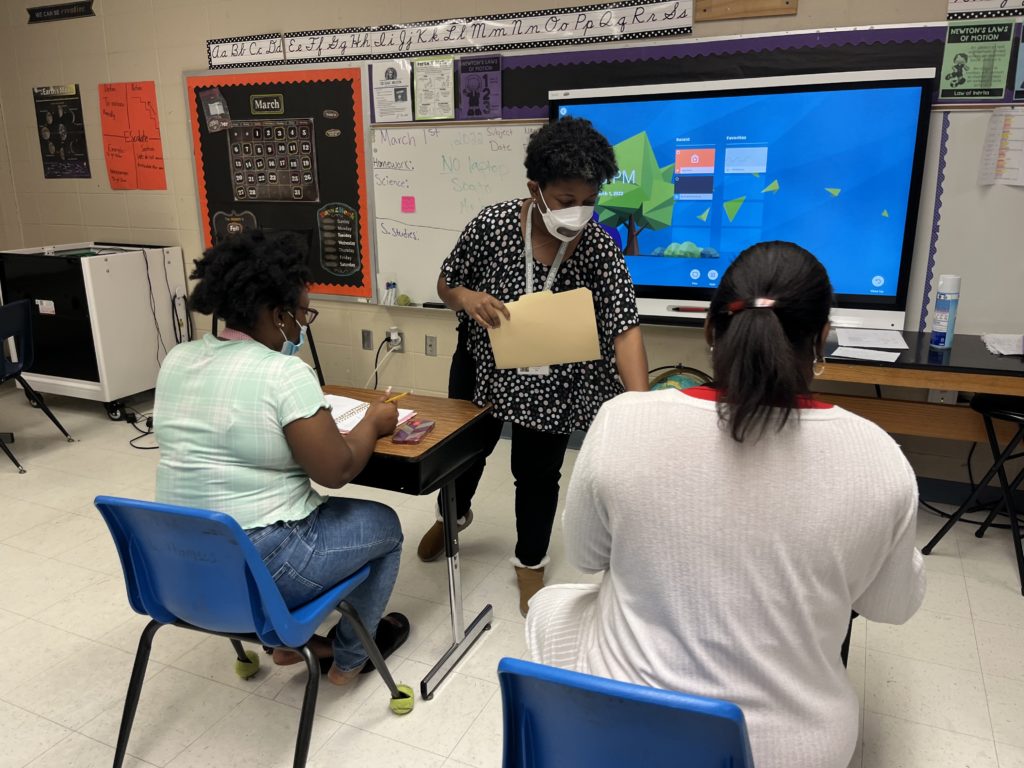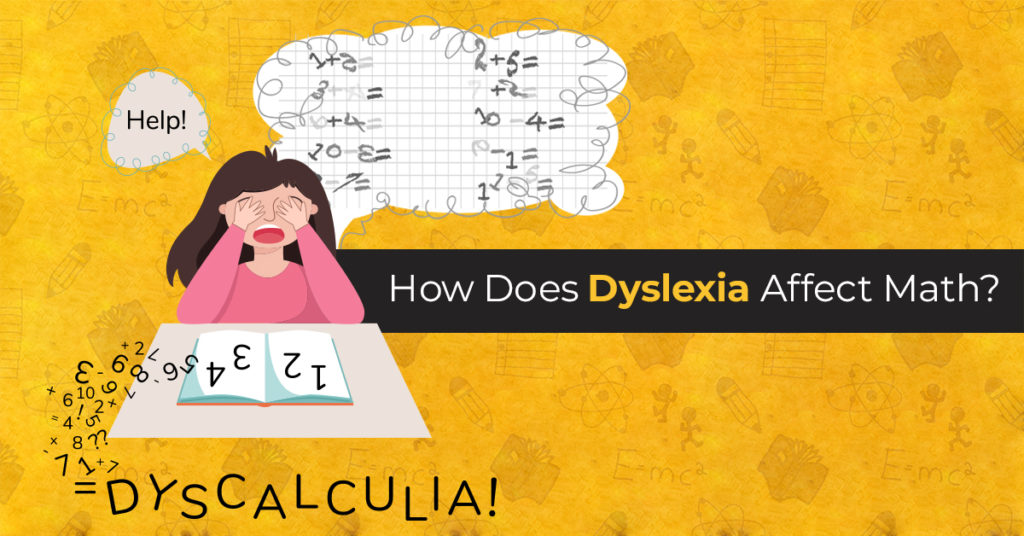It’s quite common for dyslexic children to also struggle with mathematics. Although dyslexia and mathematics disorders don’t always occur simultaneously. But, both have their roots in neurobiology and are associated with precise problems in mastering academic skills, such as reading and mathematics. Hence, their daily lives are impacted consequently. To learn how does dyslexia affect math, continue reading with us to clear your concept.
Meanwhile, dyscalculia is characterized by difficulties in acquiring mathematical concepts, like timetables, counting, and carrying out arithmetic calculations. Those having both learning disorders specify phonological processing shortages, which are associated with reading struggles in children, along with problems in processing number-related information associated with arithmetic problems. Although those who are struggling solely with dyslexia or dyscalculia don’t experience these particular difficulties.
Now the question is – “does dyslexia affect math? Even if a child has been diagnosed only with a reading incapacity, his/ her mathematics performance can also be affected. It’s likely that a child won’t respond to an exercise sheet made of mathematical language because they were unable to recognize it. To solve a mathematical problem, a child must be able to comprehend a sentence or paragraph, and even if they know how to solve the problem using the right methods and calculations, they cannot comprehend what they are being asked to do.
Therefore, dyslexia-affected children will recognize it challenging to solve math problems as they frequently lack context and use complicated words or grammar.
How To Support These Special Students?
A range of instruction is used to support students who are struggling with mathematics. To succeed in math, a number of steps must be taken that include –

LANGUAGE AND VERBAL RETRIEVAL SKILLS
Those who have dyslexia, frequently learn by tying a word to an image and reading. Because they can’t visually see words as “the, of, and, is”, so they have tendencies to frequently skip those words. When it comes to math, those students will have trouble. The word “of” has no meaning to someone with dyslexia. Hence, you need to explain to them that the word “of” has multiple meanings and is important in math.
WORKING MEMORY SKILLS
It’s the small amount of information that can be held in the working memory to complete tasks. The information is stored in working memory and retrieved over time by the brain. Depending on what needs to be brought back, the location from which the brain retrieves those math facts depends. Meanwhile, division and multiplication are stored in the language part of the brain while addition and subtraction are held in the numeracy part. This indicates that the way mathematical thinking is stored changes depending on how the brain interprets them.
SPEED OF WORKING
The speed of working compliance relies on under what amount of stress a student needs to perform. To be specific, a dyslexic student takes a 50% long time to complete or attempt to stop working on a task. Because their general capacity to collect information retrieval and application has been disrupted. Due to the timed factors, such a “slowness” can also result in a misdiagnosis of dyscalculia.
EXECUTIVE FUNCTIONING SKILLS
The ability to carry out a plan or comprehend the issue that needs to be solved is referred to as executive functioning skills. It’s the order in which you’ve got to complete a job and ways you can control your feelings. Everything requires a significant amount of time to complete and involves numerous steps. The total number of steps required to complete a math homework assignment is quite complex. All of these small tasks will be extremely difficult for a student with poor executive functioning skills to remember and complete.
VISUAL-SPATIAL SKILLS
It’s a strength for most dyslexic students, but there are some small issues that can make things difficult, like direction and position, vision issues, and spatial awareness. It’s essential to practice every small skill early on in order to solve more difficult mathematical calculations in the future. There are even steps where understanding the route will enable you to solve all the problems.
Dyslexic students are often able to spin objects in their minds and view them from multiple perspectives. Since number reversals are common, it can be easy for some students to confuse “6” and “9.” They might also think “6” but write “9” on their paper, so you need to explicitly teach them how to tell the difference visually. This has further helped by drawing a number on their back.
SPATIAL AWARENESS
A lot of dyslexics has poor alignment problems and struggles with not understanding where to start. It’s likely that they don’t know how to take the first step correctly and solve all of those problems in maths. All of the calculations can also go wrong as unable to read the questions and couldn’t write the correct answer. Hence, graph paper is a perfect tool to help those dyslexics to line up equations perfectly.
- Bitpaper: The grid size can be changed, and there is a lot of paper to scroll down for more work.
- Bigger graphs are perfect to solve mathematical problems
Dyslexia And Mathematical Skills
Dyslexia affects how the brain processes information, including the ability to recognize and manipulate mathematical symbols, such as – numbers and operators. This can make it hard to do things like count, remember facts about math, solve word problems, and do operations, like addition, subtraction, multiplication, and division. Because dyslexics will also struggle with spatial awareness and visual-spatial reasoning, which can hinder their comprehension of topics, like geometry and measurement. Due to the frustration and lack of confidence in math can result from these challenges, which can ultimately have an impact on academic performance and opportunities in the future.
Strategies to Help Dyslexics Overcome Their Math Difficulties:
Fortunately, there are a number of strategies that can assist dyslexics in overcoming their math difficulties and gaining confidence in their math skills.
- Utilize Multisensory Methods: Multisensory learning strategies often aid dyslexic learners. This means that concepts can be reinforced by utilizing a variety of senses, like sight, touch, and sound. Using physical objects like blocks or manipulatives, for instance, can help with counting and comprehending concepts related to numbers.
- Divide The Task Into More Easy Steps: Because complex math problems can be too much for dyslexics to handle. Reduce frustration and make the problem easier to manage by breaking tasks down into smaller steps. Individuals can also benefit from visual aids such as flowcharts or diagrams to comprehend the steps involved in a problem.
- Opt For Conceptual Understanding: Dyslexics benefit from focusing on conceptual understanding rather than simply memorizing math facts or procedures. This entails comprehending the rationale behind the operation of a given procedure and its connection to other ideas. Understanding the connection between addition and subtraction, for instance, can assist with both operations.
- Use The Latest Technology: Dyslexics may benefit from technological advancements. Computation, graphing, and problem-solving can all benefit from the assistance of math applications, software, and calculators. Math-related reading and writing tasks can also benefit from the use of text-to-speech and speech-to-text tools.
- Offer Encouragement And Assistance To Dyslexics: Math-related confidence and self-esteem may be a challenge for dyslexics. Providing support and encouragement can foster a positive attitude toward math and boost confidence. People can also stay motivated and engaged by celebrating small accomplishments and progress.

Conclusion
Sometimes dyslexia can affect math skills, but with the right strategies and support, dyslexics can overcome math challenges and gain confidence in their abilities. Dyslexic students can succeed in math by using multisensory approaches, breaking down tasks, focusing on conceptual understanding, utilizing technology, and providing support and encouragement. Now that you want to learn the details of how does dyslexia affect math, you can simply get in touch with us.
